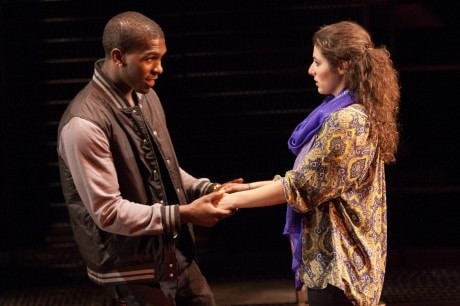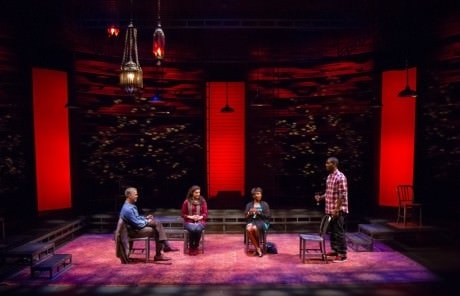Love in Afghanistan, Charles Randolph-Wright’s exquisitely woven four person drama currently playing in Arena Stage’s Kogod Cradle, centers around two families: Duke (Khris Davis) and his mother Desiree (Dawn Ursula), and Roya (Melis Aker), and her father Sayeed (Joseph Kamal). Duke is an American rapper, performing for the troops at Bagram Air Force Base in Kabul, Afghanistan, and Roya is the interpreter assigned to him for the duration of his stay.

Randolph-Wright begins and ends the play with an awkward, forward (on Duke’s part), and ultimately human conversation between Duke and Roya, in which Roya answers all of Duke’s questions with a ‘yes’ or a ‘no.’ The simplicity in this conversation is exquisite, and calls to mention whether or not you can disregard events that transpire in a friendship/relationship and truly start over with someone you have come to know, in a certain light. The play also questions how well we know ourselves, and the effect that has on the persona we let others see. Roya discusses her adolescence under the “bacha posh” tradition, in which a daughter is disguised and lives as a boy until puberty, giving the child a life she would not have had otherwise and allowing the family to overcome the pity they would have faced for not having any male children. Duke and his mother, Desiree, briefly discuss his career as a hip-hop artist and how that influences the persona he puts out in public, versus who he really is without the fame. This play, while specific in setting, dialects, and plot points, is wonderfully universal in theme and characterization.
The performances in this play are truly breathtaking, and while there is a slight undertone of melodrama to the plot of the story as a whole, the performances are organic and even out the tone. Khris Davis’ Duke is wonderful, with his bravado and his pathos equally skillful, and used at perfect moments throughout the play. Melis Aker’s Roya truthfully flawed, guarded, and wrapped up in a web of events that could blow up in any number of directions at any moment. The strength of her performance is in her ability to keep these various worlds spinning while not knocking into each other and exposing weakness. The moments in which she is caught off guard by Davis’ Duke are the most brilliant, and allow both actors to shine and elevate each other’s performances. At times, I felt voyeuristic as an audience member viewing a couple of their scenes together, for fear that I was intruding on an all too personal moment.
The supporting players in this play, if you can even call them that, provide honesty and levity at the same time, which is a credit to their performances that they are able to provide both. Dawn Ursula’s Desiree is pointed, strong, and an in control mother of a son who doesn’t always think with his head. Ursula’s performance is beautifully colored, with strength of self throughout and moments of brevity and humor that punctuate the scene and the pace of the play beautifully. Joseph Kamal’s Sayeed is careful, calculated, and traditional. He holds strong in traditional beliefs, which sometimes conflicts with his views of his daughter’s life, decisions, etc. The torn nature of the character and how Kamal adeptly plays this aspect of the character, make his performance a stand out. Ursula and Kamal have dynamite chemistry with each other, as well, and watching that chemistry play itself out is all too bittersweet.
Lucie Tiberghien’s direction is extraordinary, and provides such a calculated ride for the audience. The sharp punctuation of select moments in the play, especially when a new emotion is brought about for a character or characters, allows the audience to brace for that emotional pivot and see it through with ease, but still think about that shift, question it, and digest it. Tiberghien refines Randolph-Wright’s tone of the piece, and allows just enough melodrama in to draw the audience in, but not too much to take you out of the organic nature of the human interactions.
Daniel Conway’s scenic design is absolutely stunning and visually exciting, without being over-the- top. The use of the elevated grate around the main playing space is wonderful, and provides a devoid of emotion element that is so present in stereotypical interrogation scenes. Mark Lanks’ lighting focuses the piece, provides warmth in moments that require that, and allows for that interrogation lamp feel for added effect. Elisheba Ittoop’s original music and sound design is stellar, and really charts the emotional arc of the piece, engaging the audience from the minute they enter the theatre, through all of the scene changes, and through to the end of the piece.

Charles Randolph-Wright’s Love in Afghanistan is a fascinating look into human connection and sense of self, in a much talked about locale, with a twisting and turning plot that will excite and arouse your thoughts during, and long after, the performance.
Full of colorful performances by a virtuosic four-actor ensemble, Love in Afghanistan is a ‘Must-See.’
Running Time: Two hours, with a fifteen minute intermission.

Love in Afghanistan plays through November 17, 2013 at Arena Stage at the Mead Center for American Theater – 1101 6th Street. SW, in Washington, DC. For tickets, call the box office (202) 488-3300, or purchase them online.





We attended the play not expecting to be attending the best play in town,and see best performances on stage in decades. We were truly amazed. They are all great, but, the young actress is a ‘tour de force’! The plot is unusual yet current. Not to be missed!